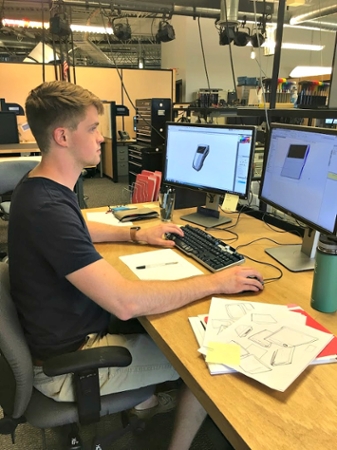Reed Fansler
Industrial Design
Electronic Theatre Controls - Middleton, WI

Describe your typical day as an intern.
Day to day, I help my supervisor, a fellow Purdue industrial design grad, generate concepts for future and current ETC products. We meet with engineers and project managers to align our goals for the product to that of the company and then begin sketching, computer modeling, and revising potential designs. I spend about 50 percent of my day with Adobe Creative Suite open and the other 50 percent with SolidWorks open.
What is the most challenging aspect of your internship?
The products we make at Electronic Theatre Controls are not consumer products as much as they are technical products. Our lights and consoles aren’t on the shelves at Target for everyone to buy. The people who know how to use our stuff are people who have spent years learning about it and using it every day. Because of this, they are very particular about the ergonomics and layout of the products. “This key needs to be right by this key because I usually keep my hands like this” is a phrase I have encountered a lot while I have been here. I have learned to put what I want aside and design for the needs of the user, which is something we learned in class but I never really understood until now.
What is the most exciting thing about your role?
At ETC, I have gotten to do real work and real projects from day one. I am not from a theater background, but apparently ETC stuff is like the Mercedes-Benz of theater controls and lighting. It is cool to be part of the team that makes the tools used to light the Grammys, Broadway shows, and amusement parks around the world.
What has surprised you most about your internship?
Working as part of Research and Development at a company is surprisingly very similar to college projects in that people are basically learning as they go. The project manager doesn’t ask for something and the engineer/designers instantly know the answer. The R&D team has to learn, design, test, re-design, and re-test many times over before a solution is found. I like this a lot because not only is the final product better, but you gain experience and knowledge along the way.